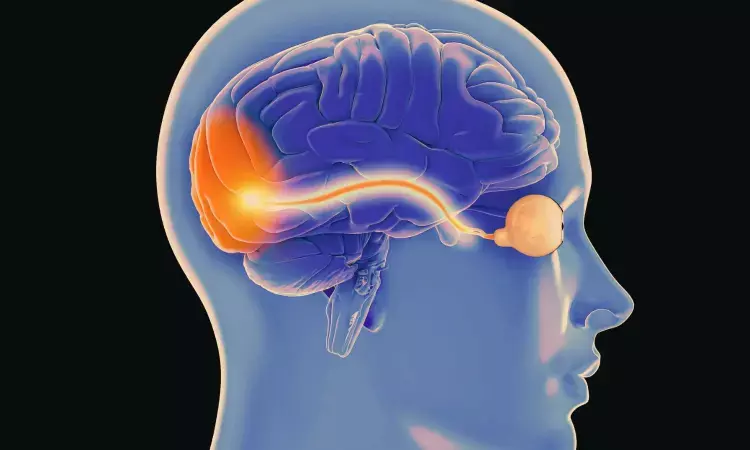- Home
- Medical news & Guidelines
- Anesthesiology
- Cardiology and CTVS
- Critical Care
- Dentistry
- Dermatology
- Diabetes and Endocrinology
- ENT
- Gastroenterology
- Medicine
- Nephrology
- Neurology
- Obstretics-Gynaecology
- Oncology
- Ophthalmology
- Orthopaedics
- Pediatrics-Neonatology
- Psychiatry
- Pulmonology
- Radiology
- Surgery
- Urology
- Laboratory Medicine
- Diet
- Nursing
- Paramedical
- Physiotherapy
- Health news
- Fact Check
- Bone Health Fact Check
- Brain Health Fact Check
- Cancer Related Fact Check
- Child Care Fact Check
- Dental and oral health fact check
- Diabetes and metabolic health fact check
- Diet and Nutrition Fact Check
- Eye and ENT Care Fact Check
- Fitness fact check
- Gut health fact check
- Heart health fact check
- Kidney health fact check
- Medical education fact check
- Men's health fact check
- Respiratory fact check
- Skin and hair care fact check
- Vaccine and Immunization fact check
- Women's health fact check
- AYUSH
- State News
- Andaman and Nicobar Islands
- Andhra Pradesh
- Arunachal Pradesh
- Assam
- Bihar
- Chandigarh
- Chattisgarh
- Dadra and Nagar Haveli
- Daman and Diu
- Delhi
- Goa
- Gujarat
- Haryana
- Himachal Pradesh
- Jammu & Kashmir
- Jharkhand
- Karnataka
- Kerala
- Ladakh
- Lakshadweep
- Madhya Pradesh
- Maharashtra
- Manipur
- Meghalaya
- Mizoram
- Nagaland
- Odisha
- Puducherry
- Punjab
- Rajasthan
- Sikkim
- Tamil Nadu
- Telangana
- Tripura
- Uttar Pradesh
- Uttrakhand
- West Bengal
- Medical Education
- Industry
Experts Caution Against High-Dose Nicotinamide for Glaucoma Due to Liver Toxicity Risks: AGS/AAO Statement

USA: The American Glaucoma Society (AGS) and the American Academy of Ophthalmology (AAO) have issued a position statement emphasizing the need for caution in using nicotinamide, a derivative of vitamin B3, as a potential therapy for glaucoma neuroprotection. While promising as a neuroprotective agent, concerns regarding its safety, particularly its potential to cause drug-induced liver injury (DILI), warrant careful consideration.
Glaucoma, a leading cause of irreversible blindness worldwide, is projected to affect 111.8 million people by 2040. Despite advances in intraocular pressure (IOP)--lowering therapies, many patients continue to experience optic nerve damage and visual field loss, underscoring the urgent need for neuroprotective agents that can slow retinal ganglion cell damage or promote recovery.
Laboratory and human studies have positioned nicotinamide as a promising candidate for neuroprotection. However, its long-term efficacy and safety remain under investigation. The AGS-AAO statement, published online in the journal Ophthalmology Glaucoma, outlines several key recommendations to guide the cautious use of nicotinamide in glaucoma management:
- Approval Status and Safety: Nicotinamide is not currently approved for glaucoma treatment. Patients and physicians considering doses below 3 grams/day should collaborate with primary care providers and conduct regular liver function tests.
- High-Dose Use Warning: Doses of 3 grams/day or more should only be administered in clinical trials with close liver function monitoring.
- Side Effect Reporting: Patients should be informed about potential side effects and encouraged to report symptoms immediately to their physician or clinical trial investigators. Reports should also be submitted to the FDA Safety Reporting Portal.
- Contraindications: Nicotinamide supplementation should not be offered to patients with current or prior liver disease.
- Distinction from Niacin: Niacin, though related to nicotinamide, is not interchangeable and is known to be hepatotoxic at high doses. Niacin is not being evaluated for glaucoma neuroprotection and should not be substituted for nicotinamide.
The AGS and AAO highlight the potential risks of self-administered nicotinamide, particularly at high doses without medical oversight. They stress the importance of patient-physician collaboration and rigorous monitoring for those considering its use.
Aakriti Garg Shukla, MD, MSc, from the Edward S. Harkness Eye Institute at Columbia University Irving Medical Center, along with her colleagues, emphasized in the statement that patients or physicians considering nicotinamide doses below 3 g/day should consult primary care physicians and undergo periodic liver function testing.
They further cautioned that high doses of nicotinamide (3 g/day or more) should not be used outside of clinical trials where liver function can be closely monitored, citing the risk of drug-induced liver injury.
"As research continues, these guidelines aim to balance the promise of nicotinamide as a neuroprotective agent with the necessity of ensuring patient safety, particularly in light of the high prevalence of dietary supplement use and the potential for unreported adverse effects," they concluded.
Reference:
Shukla AG, Cioffi GA, John SWM, Wang Q, Liebmann JM; American Glaucoma Society and American Academy of Ophthalmology. American Glaucoma Society-American Academy of Ophthalmology Position Statement on Nicotinamide Use for Glaucoma Neuroprotection. Ophthalmol Glaucoma. 2025 Jan 10:S2589-4196(25)00007-9. doi: 10.1016/j.ogla.2025.01.002. Epub ahead of print. PMID: 39800263.
Dr Kamal Kant Kohli-MBBS, DTCD- a chest specialist with more than 30 years of practice and a flair for writing clinical articles, Dr Kamal Kant Kohli joined Medical Dialogues as a Chief Editor of Medical News. Besides writing articles, as an editor, he proofreads and verifies all the medical content published on Medical Dialogues including those coming from journals, studies,medical conferences,guidelines etc. Email: drkohli@medicaldialogues.in. Contact no. 011-43720751


